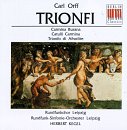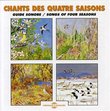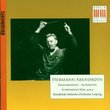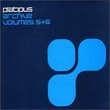| All Artists: Karl-Heinz Stryczek, Carl Orff, Herbert Kegel, Dresdner Kapellknaben, Leipzig Radio Chorus, Leipzig Radio Symphony Orchestra, Leipzig Radio Symphony Chorus, Jutta Czapski, Gerhard Erber, Gunter Philipp, Wolfgang Wappler, Celestina Casapietra, Ute Mai, Renate Krahmer, Isabella Nawe, Regina Werner, Horst Hiestermann, Eberhard Büchner Title: Carl Orff: Trionfi Members Wishing: 0 Total Copies: 0 Label: Berlin Classics Original Release Date: 1/1/2008 Re-Release Date: 2/13/1995 Genre: Classical Styles: Opera & Classical Vocal, Forms & Genres, Concertos, Historical Periods, Baroque (c.1600-1750) Number of Discs: 2 SwapaCD Credits: 2 UPC: 782124204723 |
Search - Karl-Heinz Stryczek, Carl Orff, Herbert Kegel :: Carl Orff: Trionfi
 | Karl-Heinz Stryczek, Carl Orff, Herbert Kegel Carl Orff: Trionfi Genre: Classical
|
Larger Image |
CD DetailsSimilar CDs
|
CD ReviewsThe relative anonimity of the three soloists prevent this ve Discophage | France | 12/01/2008 (4 out of 5 stars) "Herbert Kegel (1920-1990) was in my opinion one of the best conductors from former East Germany - I much prefer him to the more famous but, in my opinion, less distinctive Kurt Masur. He studied at the Dresden conservatory (Karl Böhm was one of his conducting teachers, alongside Boris Blacher for composition). From 1949 onwards he held important conducting posts with the Radio orchestra in Leipzig and (1977-1985) Dresden. Many of his recordings, originally published on the East German label Eterna, have been reissued by Berlin Classics on CD. I've heard a number of his recordings of XXth Century music (Britten, Stravinsky, Bartok, Hindemith, Berg, Schoenberg) and have often found the approach un-traditional but illuminating. The Orff recordings were made not in the order of the compositions themselves (1937, 1943 and 1953). Catulli Carmina, the middle section of the cycle which Orff subsumed under the general title "Trionfi", was recorded first in 1971. Then came the famous Carmina Burana in 1974, followed a year later by Trionfo di Afrodite. The sound is fine, affording many orchestral details and good choral definition. Overall the choral and orchestral work in Kegel's Carmina Burana is excellent. In the first two martial numbers, "'O Fortuna" and "Fortune plango vulnera" (those most associated with Orff's warhorse, to the extent that the rest of this superb composition is often neglected), you may find more ominous bite and angular muscle with the Berlin Opera Chorus in Jochum's classic recording from 1967 (I've reviewed it under its first CD release, Orff: Carmina Burana), but the advantage is not systematically with Jochum. Kegel's Leipzig Radio Chorus sounds powerful, majestic, pitch-right and tonally ingratiating, the Boys chorus from Dresden is suitably child-like (track 15, "Amor volat undique"), and both are well-sustained by the orchestra. I only regret that (playing by ear) Kegel has number 19, "Si puer cum puellula" sung not by baritone, 3 solo tenors and 2 basses from the chorus as instructed, but by solo baritone and full men's chorus. It sounds much better as written. But where Kegel fails to make his way quite to the top drawer is in the area of soloists. Tenor Horst Hiestermann is fine enough, and in "Olim lacus colueram" (track 12) it is hard to tell if it is a tenor singing or an old hag of a mezzo burnt out on singing too much Lady Macbeth and Jocasta and Agrippina - which is exactly how Orff wanted it to sound, asking the tenor to sing in falsetto to convey a sense of wracking torture (it is the roasting swan that is singing). But truth is, Gerhard Stolze under Jochum finds even more striking details in his characterization. Baritone Karl-Heinz Stryczek is valiant (his and the chorus' "Wafna!" - Woe - in "Ego sum abbas", track 13, is very impressive) but not particularly distinctive, both in timbre (the voice is big but tends to lack focus) and in characterization. He imbues "Omnia Sol temperat" (track 4) with a sense of sorrow and lament that is absolutely not in character here ("the sun warms everything, once again revealing to the world April's face, man's soul is urged toward love..."): the same is more in situation in "Dies, nox et omnia" (track 16 - "Day, night and everything is against me, the chattering of maidens makes me weep...") and Stryczek manages Orff's unique falsetto demands. In "Estuans interius" (track 11), he and Kegel are somewhat heavy-footed and fail to completely convey the music's bite and anger ("Burning inside with violent anger, bitterly I speak to my heart"). I am usually no great fan of Dietrich Fischer-Dieskau, but here, with Jochum, his rather light and always clear baritone and his fine sense of theatrics are incomparable. Any soprano is going to have a hard time matching up to the unique blend of angelic purity and steel power of delivery of Gundula Janowitz with Jochum, and Celestina Casapietra (Mrs Kegel in every day life) isn't in that league. Usually her soprano timbre is commendably pure-sounding, but anybody will sound, at least in spots, somewhat matronly in comparison to Janowitz, and Casapietra even sounds somewhat labored in "In trutina" (track 21). Her final "Dulcissime" (track 23) is not bad at all - ah, if Janowitz hadn't been there before. With her, the movement lasts no more than 30 seconds (44 with Casapietra) but you get 30 seconds of eternity. In sum, this is not the ultimate Carmina Burana, although it is another fine testimony of Kegel's art of conducting, and one I am happy to have as the set offers the two and more rarely heard pendants from the Trionfi cycle. I won't go into detailed comparisons as these are my first and only recordings of Catulli Carmina and Trionfo di Afrodite. Musically I find the pieces even more accomplished than Carmina, although perhaps without moments as striking as Carmina's powerful choral introduction and unique soprano arias. More than Carmina, both compositions I feel are theatrical even more than musical experiences. Trionfo di Afrodite in particular evokes my favorite Orff composition, written 4 years before: his opera Antigonae (Orff: Antigonae). Both seem played with great theatrical characterization and fine voices from the soloists, but the absence of texts in the booklet is certainly a drawback to full enjoyment. Both discs are well filled: respectively 71:30 and 65:30 minutes. Note that the set as been recently re-released in Europe in a box with Kegel's recordings of the two Orff operas "Die Kluge" and "Der Mond" (previously released by Berlin on a companion set, Orff: Die Kluge/Der Mond. You will find that box on the European sister companies under ASIN B00006RGNE. " The best version of Carmina Burana I've ever heard M. Kessler | Washington, DC, USA | 08/01/2006 (5 out of 5 stars) "We own several versions of Orff's Carmina Burana, including this one, Robert Shaw conducting the Atlanta Symphony Orchestra and André Previn conducting the LSO. This recording features a great orchestra well-balanced with a great chorus and soloists for the finest recording I've yet heard. Since there are so many versions that have been recorded, I would never have guessed that Kegel and the Leipzig Radio Symphony Orchestra and Chorus would trump the rest if not for a friend's excellent recommendation."
|

 Track Listings (26) - Disc #1
Track Listings (26) - Disc #1


